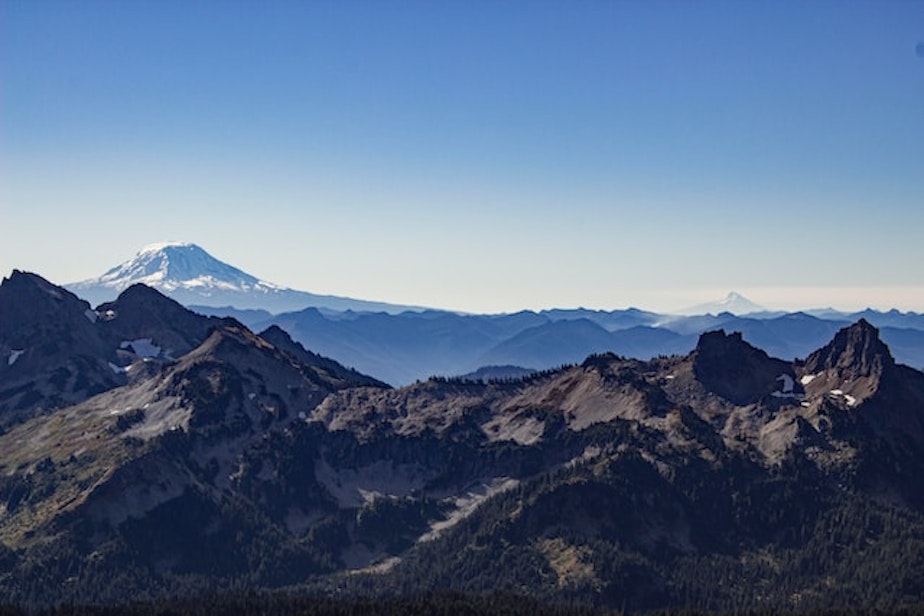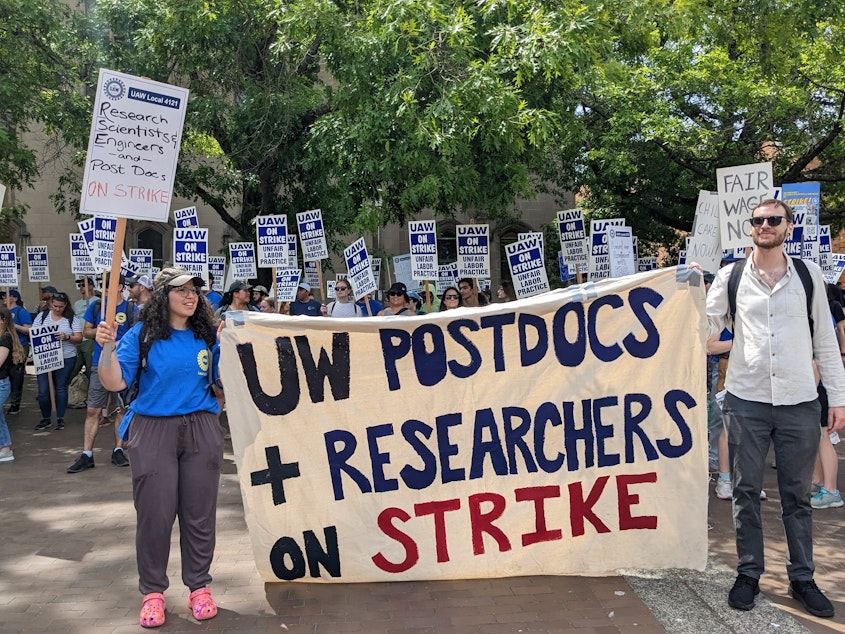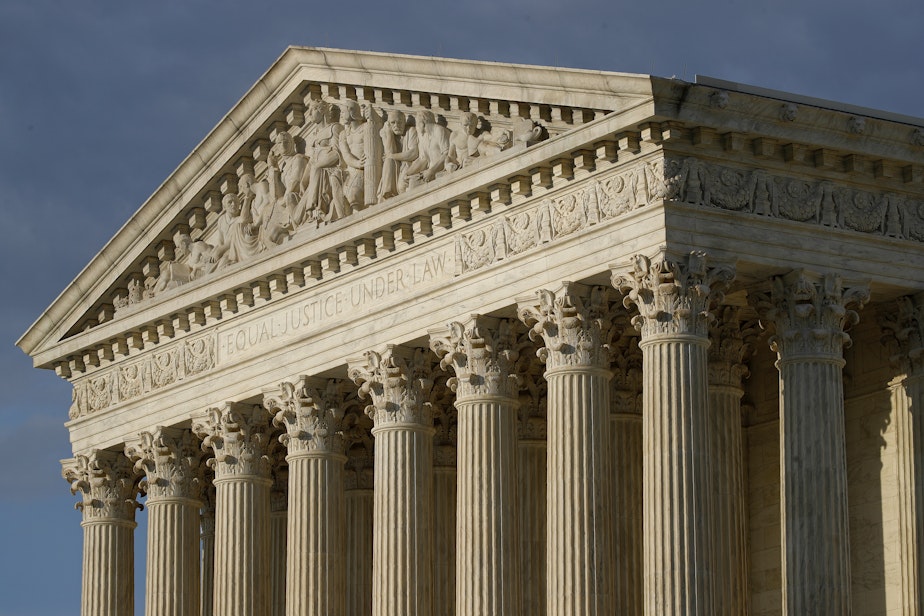Get ready for 'peak dryness' across the NW: Today So Far

- Peak dryness is coming to the Northwest much sooner than expected this year.
- Property values are going down around Seattle.
- A challenge to Washington's "assault weapon" ban gets an answer from the court.
This post originally appeared in KUOW's Today So Far newsletter for June 8, 2023.
The Northwest is approaching "peak dryness." Don't worry, I'm not going to say that Seattle is "thirsty" again.
Peak dryness is a time when the region dries out after summer weather hits. Here's the thing — it's happening a lot sooner than usual. It generally comes around the end of summer. Forecasters are expecting it to hit around next month. Despite April being one of the coldest on record, forecasters have expected the summer to be on the dry side.
You know what the next thought a lot of folks are having: wildfires. Many blazes are currently burning in Canada. The National Weather Service already issued one warning for the potential of flames to emerge locally. Now might be a good time to get those N95 masks and air filters ready. Read more here.
This is news we don't often hear: Property values are going down around Seattle. That's the headline for King County where home values are on the decline.
The recent downward trend is being considered a market correction after last year's steep rise in prices. Of course, this all depends on where you live. As KUOW's Diana Opong reports, a homeowner in Seattle's Queen Anne might see a reduction of about 8% while someone on the Sammamish Plateau could see more than 20%.
Sponsored
Here's the other big takeaway: This doesn't mean your local property taxes will go down. Sure, property values usually dictate property taxes, but there are other considerations at play, depending on where you live. Check out the full story here.
After Washington's state Legislature passed a ban on assault-style weapons last session, multiple lawsuits were filed, challenging the new law. One of them just became the first lawsuit to get an answer from a judge — it was basically tossed out.
The Second Amendment Foundation argued that HB 1240, aka an "assault weapons" ban, is unconstitutional. A U.S. District Court judge in Tacoma didn't agree with the argument, and said the gun rights group did not show that public interest favors a preliminary injunction. He concluded that it should be denied. That's fancy court talk for, "this case isn't moving forward."
There is a catch, however. It's more accurate to say something along the lines of, "This case isn't moving forward, as is." The judge denied the case "without prejudice," which means the Second Amendment Foundation has the option to refile it and start over from square one. It could take the judge's comments into consideration, modify the case, and try again.
Finally, I'm going to have to set the record straight, maybe, maybe not, sort of, we'll see. It depends on which angle you want to come at this from. Remember how I said the news around Seattle's proposal to handle drug possession was "nuanced"? Turns out, it's deeper than even I thought.
Sponsored
Refresher: Seattle City Attorney Ann Davison promoted a bill that would establish a drug possession law in Seattle and allow her office to handle such misdemeanor cases. The aim was to align the city's local law with the new state law that recently passed the Legislature — it favored diversion programs and treatment ahead of jail time. With a 5-4 vote, the City Council rejected the measure because the majority favored diversion programs and treatment ahead of jail time (yeah, I know). The council members voting "no" argued that Seattle doesn't have resources for treatment programs and the bill would just result in the arrest of poor people and people of color. They also said that Seattle police could still arrest people under the state law, and the King County Prosecutor's Office would handle these cases.
Here's where things get messy. King County Prosecutor Leesa Manion wrote to each council member on May 31 and told them, in short, it's not so easy. For KCPO to handle Seattle's drug cases, it argues that the city and the county would have to negotiate and approve a contract for those services.
"There is an incorrect notion that misdemeanor drug possession or public use cases falling within Seattle city limits can simply be referred to King County to handle as contracted services," Manion wrote. "State law may technically allow for a municipality to enter into a contract for prosecution services, but the contract would need to be negotiated and agreed upon. The (Prosecuting Attorney's Office) does not have the funding or the staff necessary to take on a new body of misdemeanor cases. Further, I can think of no precedent where a contract for prosecution services pertains to a select subset of misdemeanor and gross misdemeanors."
The prosecutor's office also sent another message to clarify what it called "misinformation circulating on this issue." It encouraged Seattle to pass its own bill for drug possession.
"Some folks are incorrectly looking at the first part of that RCW, which says 'each county, city and town, …' and presuming that King County immediately can file gross misdemeanors – but that is not the case. The law is clear that each city is responsible for misdemeanor and gross misdemeanor offenses in their jurisdiction – meaning that the City of Seattle is responsible for misdemeanor and gross misdemeanor prosecutions within the city."
Sponsored
Yesterday, Councilmember Lisa Herbold posted a blog "setting the record straight," which doubled down on her argument: "No, drug possession and public drug use are illegal in Seattle and will remain illegal. The Seattle Police Department still has the power to arrest people for breaking Washington State’s drug laws. The King County Prosecuting Attorney’s Office will still have the power to prosecute people for breaking Washington State’s drug laws."
To sum up the prosecutor and the Council — it's a big gray area and nobody will say "yes" or "no." And me? I'm trying to cover all this without saying things either way (because that's the sort of situation we're in), so I'm guilty of going gray too.
What does this all mean? Who is correct? These distinctions, and legal wordings, even had KUOW Editor Catharine Smith and I going back and forth over what is exactly being said here. Can the county handle Seattle's drug cases? Could the county technically come up with a contract with the city, but is basically saying, "We're not interested"? I followed up with the prosecutor's office, and was told that it will handle the law in unincorporated King County, and other than that, we'll see what happens.
Like I said, it gets messy. Right now, most news outlets in Seattle are reporting that King County will handle Seattle's gross misdemeanor drug cases. The Council is also saying that (except for Councilmember Sara Nelson who voted for the bill and had some fighting words after it failed). The Prosecutor's Office is saying a lot, but is basically watching to see what happens. If I were to make a Dyer prediction: Either the Seattle Council or KCPO will give in, or we're about to see them butt heads if/when these cases start coming.
Meanwhile, King County had In 661 drug overdose deaths in 2022, and as of April 2023, more than 400.
Sponsored
AS SEEN ON KUOW

Thousands of University of Washington research scientists and postdoctoral researchers went on strike Wednesday to demand living wages, child-care support, and other benefits. Many of them descended on UW’s Red Square for a rally kicking off the strike. Others picketed at locations across the university campus. (Monica Nickelsburg / KUOW)
DID YOU KNOW?
Washington state has a new apple. No, I'm not talking about the Cosmic Crisp. I'm talking about "WA-64." That's the name that Washington State University apple breeders are calling the latest apple they have created by cross pollinating from other varieties.
Sponsored
WSU horticulturalists basically took pollen from Pink Lady apple trees and blended them with Honeycrisp trees. The result is an apple that is tart and sweet, pale pink on a yellow background. Of course, a more appealing name than "WA-64" will be coming along.
Why is WSU breeding new apples? Aren't the classic Red, Fuji, or Gala just fine? Read more here.
Also, KUOW's Bill Radke is taking suggestions on what the new name eventually should be. Got an idea? Email him at bradke@kuow.org.
ALSO ON OUR MINDS

Supreme Court upholds provision prohibiting racial gerrymandering
By a vote of 5-4, a coalition of liberal and conservative justices essentially upheld the court's 1986 decision requiring that in states where voting is racially polarized, the legislature must create the maximum number of majority-Black or near-majority-Black congressional districts, using traditional redistricting criteria.

